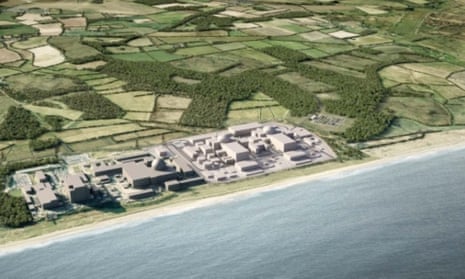The government will make its first direct investment in a large-scale nuclear reactor since 1995 after pledging to plough up to £1.7bn of taxpayers’ money into a new power plant.
Treasury documents published alongside the autumn statement did not name which nuclear project would be in line for the public funds, but the Guardian understands it is most likely to be the planned £20bn Sizewell C plant in Suffolk.
Government officials are locked in talks with Sizewell C’s developer, the French state-backed energy company EDF, about how to finance its successor to the Hinkley Point C plant in Somerset.
The first investment would be enough to hand the UK government an 8.5% stake in Sizewell C, and potentially oust China General Nuclear (CGN) from the project with help from private investors.
The plant, which is still going through the planning process, could eventually power 6m homes, but has been plagued by opposition from local campaigners, concerns about costs and the involvement of state-owned CGN.
The Guardian understands that the government is eager to replace CGN, which has a 20% share of Sizewell, through a combination of government and private sector investment, due to growing security concerns over Chinese involvement in critical national infrastructure.
The government set out new legislation earlier this week for a financial support framework for nuclear plants which would make the projects more attractive to investors by piling part of the upfront cost on to household energy bills before the plants start generating electricity.
By making a direct investment in a nuclear plant through the new financial framework, known as a Regulated Asset Base (RAB) model, the government could effectively put both taxpayers and energy bill payers on the hook for costly construction delays.
The Treasury said the £1.7bn of direct government funding would help to secure a final investment decision in a major nuclear power plant before the end of this parliament, which was a key pillar within the government’s net zero strategy, published last week.
Tom Greatrex, the chief executive of the Nuclear Industry Association, said: “This is a big vote of confidence in nuclear and a historic step forward for nuclear investment.”
“We can’t get to net zero without investing in new nuclear capacity, and this is a clear signal from government to investors that it sees nuclear as essential to our clean energy transition,” he said. “This is not only an investment in a greener future, but also in jobs and skills right across the country.”
A spokesperson for the Treasury was not immediately available to comment.
The government’s nuclear ambitions are also backed by £385m for research and development of ‘advanced nuclear’ technologies, and it has set aside £120m to address the nuclear industry’s barriers to entry.
The Treasury also revealed that it would make up to £230m from the Global Britain Investment Fund available to support investment in the UK’s offshore wind manufacturing sector.
